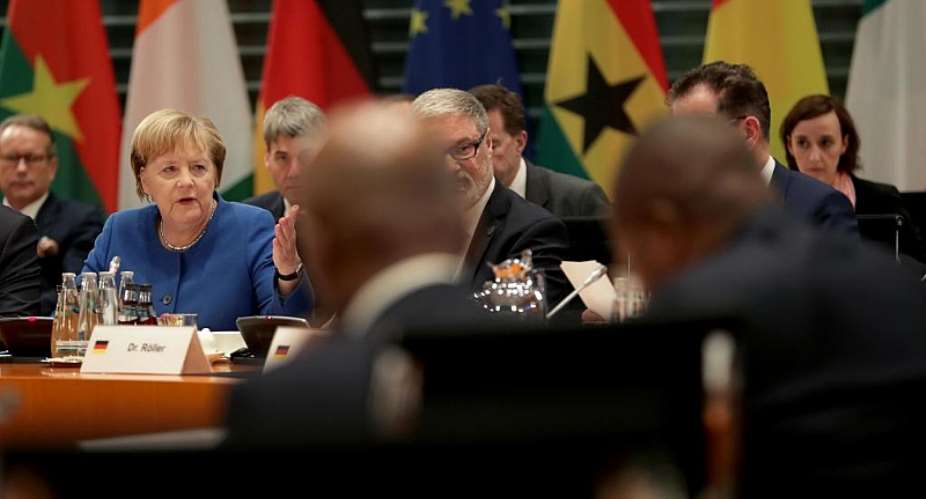Speaking at the third G20 Compact with Africa Summit in Berlin, German Chancellor Angela Merkel has urged more businesses to invest in Africa. But two years after its launch, experts say the compact has failed to reassure investors.
"We should do everything we can to cooperate with Africa, not to talk about Africa, but to do something together," Merkel said, as she hosted participating African leaders in Berlin on Tuesday.
It was the third major Africa conference in two years, since Germany launched its flagship Compact with Africa initiated under the German presidency of the G20 group of countries.
Aimed at boosting private investment in African countries that commit themselves to macroeconomic reforms, the compact has sparked interest from twelve African nations, compared to seven when it first began.
German businesses however, are more reluctant to get on board, since they are averse to any form of risk.
To reassure foreign investors, Merkel is calling for more transparency from the twelve compact countries, including Côte d'Ivoire, Ghana, Ethiopia, Morocco and Tunisia.
Risk perception high
A report last month found that African countries are, indeed, on the road to reform.
"Often you hear 'they have to reform'. That's also what Ms Merkel said on Tuesday: 'keep on reforming'. But our report finds that's the only bright point. These countries did markedly improve their governance," says Helmut Reisen, co-author of the report "G20 Compact with Africa, the Audacity of Hope," published by the Friedrich Ebert foundation, a German political organisation associated with the Social Democratic Party, part of Angela Merkel's ruling coalition.
Despite these improvements, structural impediments such as excessive bureaucracy, corruption and conflict continue to hampen foreign direct investment.
Small and medium-size companies, in particular, which form the backbone of Germany's economy and, "which are normally very good for Africa because they give apprenticeships to young Africans (...) weigh the risks and the paperwork very highly," Reisen told RFI.
So far, the Compact with Africa has seen German exports to participating countries rise by nine percent, although part of this has been secured by government guarantees. German businesses still invest four times less than China.
Summit vs. Reality
Last year, the German government set up a €1 billion investment fund to promote private investment and the development of infrastructure. On Tuesday, some investors promised to support projects involving German and African companies.
"There's a difference between the promises made at a summit and what actually happens on the ground," comments Reisen.
"The compact may be only two years old, but what we see is that foreign direct investment flows overall to the twelve countries on average is stagnating, it's not going up," he said.
One reason for that may be due to the audacity of the compact's approach, centred on private capital, the least likely source of funding for infrastructure in low-income countries.
Fear of investment in low-income countries
Out of the twelve countries included in the compact, three are emerging: Tunisia, Morocco and Egypt. The others are low-income and were part of the Highly Indebted Poor Countries initiative twenty years ago.
"Private finance doesn't have a role in these low-income countries. That's why the compact is audacious. It's a sort of headwind that this Compact with Africa has confronted from the beginning," says Reisen.
Underpinning the investment drive, which was launched in 2017 after Germany took in more than one million migrants, was the idea that investment would create jobs in Africa and thus tackle the root cause of migration.
Fighting migration
"We have a German word, which is really awful: Fluchtursachenbekämpfung, which means 'fighting against migration and people flying from Africa to Europe'. That was the major motivation of the compact," says Reisen.
"That may explain why, for example, remittances by migrants don't play a role at all in the compact but they should. If you look at a country like Senegal remittances are a major source of funding for development," he reckons.
Money sent home by migrants is also a better source of funding for Africa's fast-growing young population.
"The transfer from migrants normally establishes more labour-intensive activities in rural areas compared to foreign direct investment, which is capital intensive, often in mining activities which doesn't absorb much labour," Reisen said.





 Chairman Kingsley Owusu Brobbey calls for Privatization of Electricity
Chairman Kingsley Owusu Brobbey calls for Privatization of Electricity
 Train accident: Four more grabbed and remanded
Train accident: Four more grabbed and remanded
 Gov't to consolidate cash waterfall revenue collection accounts
Gov't to consolidate cash waterfall revenue collection accounts
 Gov't to settle lump sum for retired teachers by April 27
Gov't to settle lump sum for retired teachers by April 27
 Former PPA CEO granted GH₵4million bail
Former PPA CEO granted GH₵4million bail
 Dumsor: The darkness has exposed you; you’ll go down as the worst in Ghana’s his...
Dumsor: The darkness has exposed you; you’ll go down as the worst in Ghana’s his...
 Dumsor: The ‘incompetent’ person provided a timetable whiles those who came to s...
Dumsor: The ‘incompetent’ person provided a timetable whiles those who came to s...
 Defend, ensure NPP’s good works are ‘sold’ and highlight the ‘bad’ state of the ...
Defend, ensure NPP’s good works are ‘sold’ and highlight the ‘bad’ state of the ...
 Bawumia will rank high ahead of Mahama in any anti-corruption test — Salam Musta...
Bawumia will rank high ahead of Mahama in any anti-corruption test — Salam Musta...
 NPP trying to bribe us but we‘ll not trade our integrity on the altar of corrupt...
NPP trying to bribe us but we‘ll not trade our integrity on the altar of corrupt...
